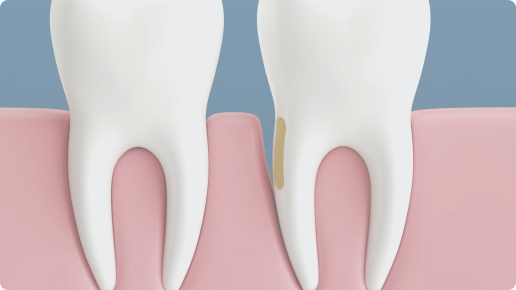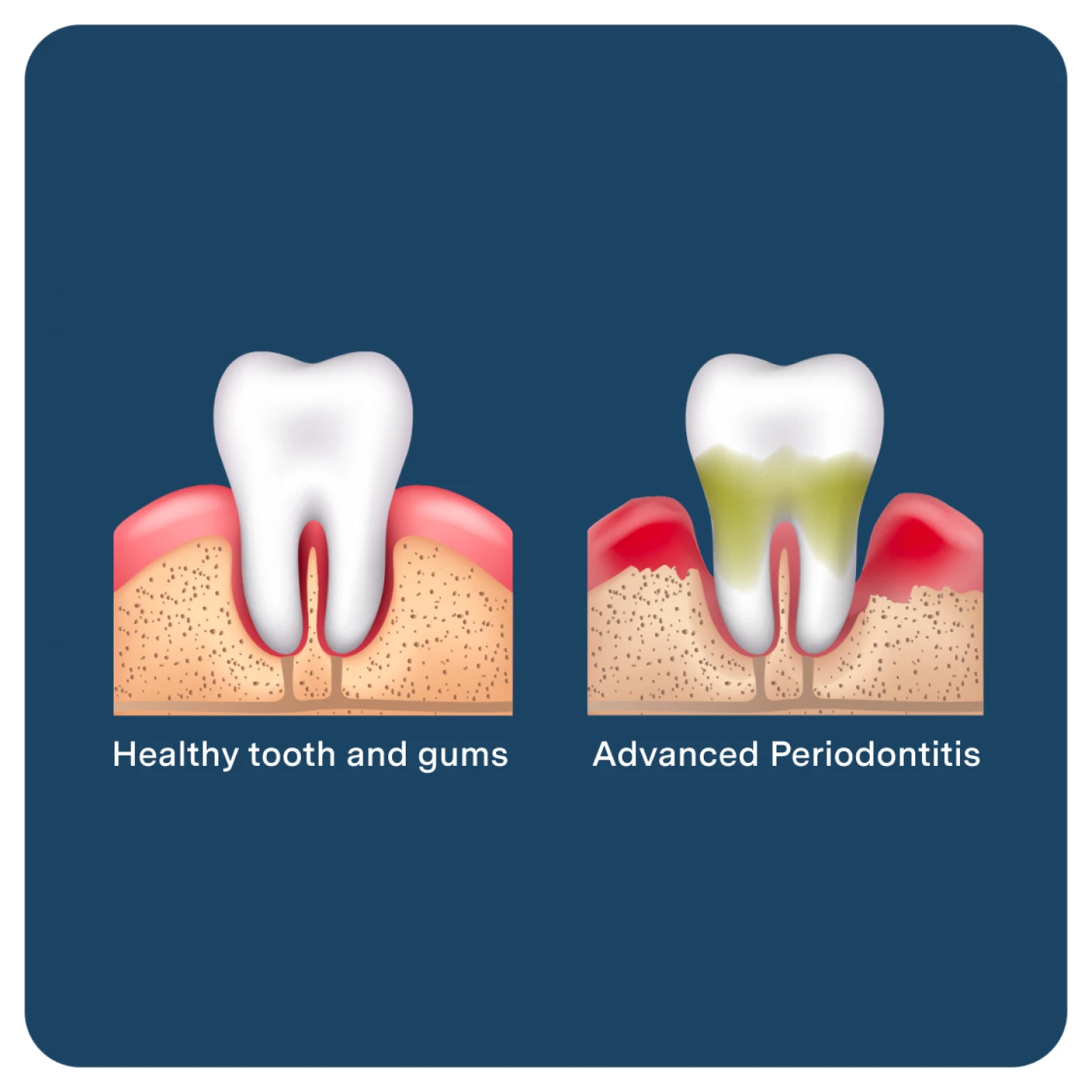Periodontal disease treatment
Discover the key to a healthier smile with our advanced periodontal disease treatment—it not only revitalizes gum health but also plays a crucial role in preventing further damage.
What is periodontal disease (periodontitis)?
Periodontal disease, which is also known as periodontitis, is a severe form of gum disease. It occurs when plaque and tartar accumulate on teeth, causing damage to the gums and bones supporting the teeth. Periodontitis is usually caused by poor oral hygiene, lack of regular professional cleanings, and systemic health issues.
As seen here, periodontal disease is the final stage of gum disease. If left untreated, the gums can eventually pull away from the teeth, creating pockets that become infected, resulting in periodontitis. This can ultimately lead to tooth loss and other oral health problems.
How we diagnose periodontal disease
With a step-by-step process, you’ll get personalized care that includes a full evaluation and a precise diagnosis for periodontal disease from your dental team at Aspen Dental.

Dental X-rays
These high-tech images can show evidence of any bone loss that may exist underneath your gums.

Periodontal charting
When you hear your dentist or hygienist call out a series of numbers after probing each tooth, we’re measuring the depth of the space between your teeth and gum tissue. The deeper the pocket, the higher the risk of tooth loss.

Genetics & health history
Genetics and health history play a big role in periodontal disease. Your genetic makeup can make you more vulnerable, especially in aggressive cases. How fast it progresses can also be affected by health risks such as diabetes or smoking habits.
What to expect at your periodontal treatment appointment
Our goal is to avoid tooth loss. That’s why treating periodontitis as early as possible is critical for your health.
While the condition may not be reversible, it can be treated and maintained through meticulous professional and home oral care.
It’s also necessary to keep up on 3-month re-care intervals to maintain healthy gums and the bone surrounding your teeth.
Assess teeth and gums
Reduce inflammation
Kill bacteria

Treating periodontal disease
Want a closer look at how we treat periodontal disease? Watch the video to see treatment steps like scaling and root planing, irrigation, and antibacterial care to maintain your oral health.
Save today on your periodontal care
No insurance? No worries. Get the dental care savings you need for a price you’ll love. Sign up today for only $39 per year.
Periodontal maintenance
After your periodontal disease treatment, you will get instructions for ongoing oral care, which may include professional maintenance or at-home care.

Professional care plan
The bacteria that cause periodontal disease repopulate in 3 months after treatment. Stay your healthiest with our Periodontal Maintenance Plan every 90 days with a 45-60 minute session that includes:
Thorough oral hygiene guidance
Meticulous gum evaluation
Precise periodontal charting
Scaling and root planing
Professional irrigation using antibacterial solutions

Periodontal home care
How to maintain good oral health at home? Here’s a few ways to keep gum disease at bay.
Brush twice a day
Use an electric toothbrush
Use prescription-strength toothpaste
Floss with a power floss device
Rinse with medicated mouthwash
Periodontal disease treatment FAQs
What causes gum disease?
While anyone can get gum disease, your risk of getting it increases in certain instances, including:
Not regularly brushing and flossing your teeth and gums
Smoking, chewing tobacco, vaping, and dipping
High white blood cell count caused by diseases such as HIV, autoimmune disorders, and diabetes
Your age (chances increase after age 65)
Medications
Birth control pills or pregnancy and the resulting hormone changes
Genetics
How do dental professionals identify periodontal disease (periodontitis)?
Using a periodontal probe, your dentist or hygienist can gently measure how deep the pockets around each of your teeth are. Healthy teeth have a pocket depth of 3 millimeters or less—so the lower the number, the better your health. As gum disease grows in severity, the pocket becomes deeper, giving bacteria even more access to your teeth, tissues, gums and jaw.
If your oral health specialist suspects periodontitis is setting in, they may recommend an X-ray. Dental X-rays show the amount of bone supporting your teeth at any given time. If bone density is reduced in either width or length, this could be a sign that periodontal disease is taking effect.
Are there other diseases linked to gum disease?
People with heart disease and diabetes are more likely to experience gum disease, as are those who have had a stroke or deal with high amounts of stress. Unfortunately, science has not yet identified the link between these diseases and gum disease, so it’s important to speak with your dentist about any long-term health issues you may have.
How do you prevent periodontitis?
An estimated 70% of people over age 65 have some form of gum disease. Potentially, any patient with a past history of periodontitis can develop recurrent periodontitis if adequate oral hygiene is not maintained.
Here are some simple things you can do to help your gums heal and prevent future problems:
Brush your teeth 2 times a day for 2 minutes each time. Use a power toothbrush with soft bristles and toothpaste with fluoride. Fluoride is a natural mineral that helps keep teeth strong.
Clean your teeth daily to remove plaque and bits of food from between your teeth. If your gums have loosened, it may be best to use smaller brushes, picks, wider types of floss, or a power flosser to clean between your teeth.
Your dentist may also recommend regularly using a specific mouth rinse.
Look for the American Dental Association Seal of Acceptance on your dental care products. The ADA Seal means these products have met ADA standards for safety and effectiveness. Ask your care team about the Aspen Oral Health Bundle with ADA-accepted and recognized dental care tools to help you maintain optimal oral health at home.
How do you ensure periodontitis stays away?
If you suspect periodontitis, it’s likely that you’ll need to see your Aspen Dental dentist more often than normal. Your gum pockets, which is the space between your teeth and gums, may make it harder for you to clean the plaque off your teeth. Meaning, your oral health could likely benefit from periodontal treatment—something you have heard called deep cleaning. Your dentist will talk to you about a treatment plan that works best for you.
Over time, fewer appointments may be necessary. Once the health of your gums is restored, your dentist will determine a maintenance schedule based on your clinical evaluations.
An important part of your care plan will incorporate periodontal cleanings, also known as dental deep cleanings. This is a more extensive cleaning process than the standard to ensure your gums stay healthy. With personalized periodontal maintenance, the amount of plaque bacteria is lowered, calming inflammation and allowing your pockets to shrink. This will lead to healthier gums and a refreshed smile.
We also recommend taking any medication as prescribed by your dentist. They may prescribe you rinses and gels to manage inflammation or discomfort. Your teeth may feel sensitive after treatment, and the medication can help you return to your regular daily activities. Additionally, your periodontist may recommend a special toothpaste or other treatments to decrease your tooth sensitivity.
Although you may experience discomfort and be tempted to avoid cleaning the treated areas, it’s important to follow your dentist’s instructions for at-home care to support the health of your teeth and gums.
Get treated for periodontal disease
Get a diagnosis or come back in for your 3-month visit
Early detection and regular, professional maintenance are key to keeping periodontitis in check—visit us today for your best oral health.



